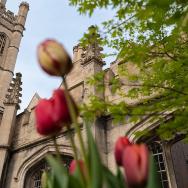Three University of Chicago scholars have been elected to the National Academy of Sciences, in recognition of their distinguished scientific research achievements.
Profs. Jeffrey Hubbell, Anthony A. Kossiakoff and Eduardo A. Perozo are among the 120 new members elected this year. Another 23 international members were recognized in the May 2 announcement.
Learn more about this year’s honorees:

Jeffrey Hubbell is the Eugene Bell Professor in Tissue Engineering in the Pritzker School of Molecular Engineering. An international leader in bioengineering, Hubbell develops molecular and materials engineering approaches to advance immunotherapy.
His research is focused on vaccination in infectious disease, cancer and autoimmune disease. Hubbell designs materials that stimulate the immune system to fight infection or malignancy according to design, disabling certain aspects of the immune response to address auto-immune diseases such as multiple sclerosis or celiac disease. He coined the term “immuno-modulatory materials” to describe this newly emerging field of research. Along with his research associates, he holds more than 100 patents and has founded five companies.
Hubbell is the only UChicago faculty member to be elected to all three National Academies: the National Academy of Sciences, the National Academy of Engineering and the National Academy of Medicine. Hubbell also is a member of the National Academy of Inventors.

Anthony Kossiakoff is the Otho S.A. Sprague Distinguished Service Professor of Biochemistry and Molecular Biology. He is a structural biologist and protein engineer whose research group is developing a molecular understanding of how molecular recognition governs virtually all aspects of biological function. He did pioneering work towards elucidating the mechanisms involved in hormone-induced receptor activation and regulation.
To study these issues, his lab uses a combination of protein engineering, X-ray crystallography and cryo-electron microscopy, directed evolution and biophysical analysis. His group has also pioneered a new technology called “chaperone-assisted” structure determination, which has facilitated the structural analyses of protein systems that had been intractable by other approaches. Kossiakoff’s lab has also been at the forefront of developing synthetic antibodies, which are more powerful than traditional monoclonal antibodies and have the potential to replace them for uses as biotherapeutics and in cell biological applications.
Kossiakoff served as Chair of the Department of Biochemistry and Molecular Biology from 1998 to 2011 and was named as a Fellow of American Association for Advancement of Science in 2012.

Eduardo Perozo is a Professor of Biochemistry and Molecular Biology. He is a molecular neurobiologist whose research aims to understand the physiological and structural mechanism underlying ion channels and other membrane proteins associated to electrical and mechanical signaling.
Perozo’s lab seeks to define the molecular principles that drive the transduction of different forms energy, such as electric fields and mechanical forces, into protein motion. He is particularly interested in protein dynamics, which link structure to function. The Perozo lab uses a combination of functional measurements at the single molecule and ensemble levels, biochemistry and molecular biology, and EPR spectroscopy, performing structural analyses through a combination X-ray crystallography and cryo-electron microscopy of single particles. These structural techniques help them understand biological functions like mechanosensitivity in hearing and proprioception, and how proteins sense changes in electrical voltage in neurons and other excitable tissues.
Perozo is the director of the newly formed Center for Mechanical Excitability, a Senior Fellow of the UChicago Institute for Integrative Physiology, and is affiliated with the Institute for Biophysical Dynamics.








